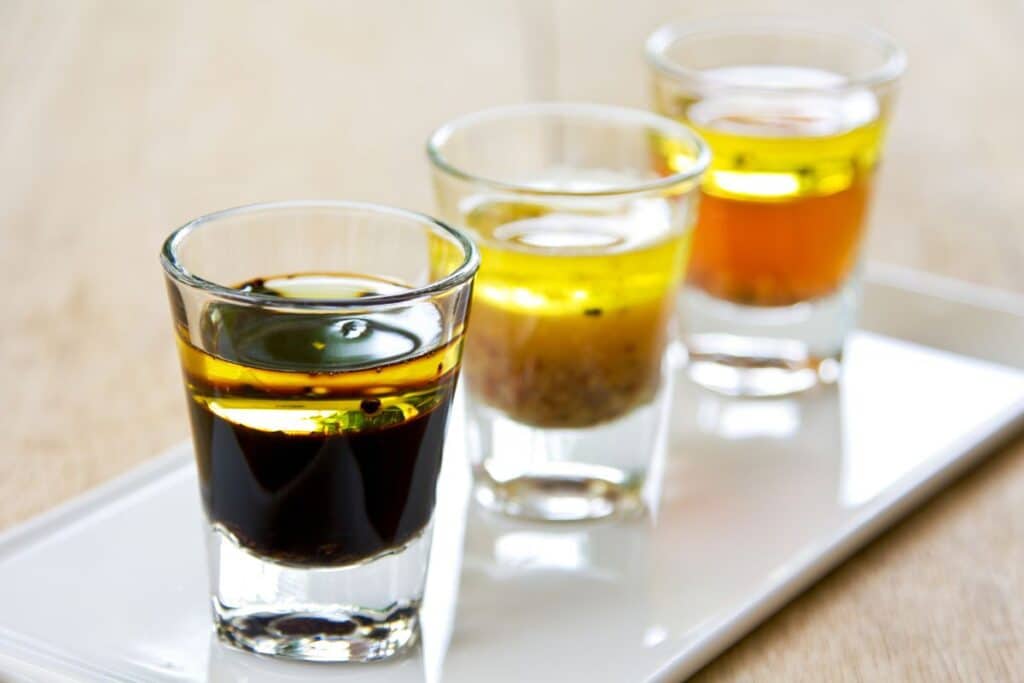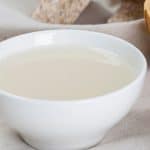In summary: Sherry vinegar can be substituted with unseasoned rice wine vinegar, champagne vinegar, apple cider vinegar, fruit vinegars, etc. Consider the specific taste you want to achieve when selecting the best substitute.
Since authentic sherry vinegar is a product imported from Spain, you may be hard-pressed to find it in smaller grocery stores. If you do, it will probably cost a lot more than other vinegar.
When your recipe calls for sherry vinegar and you don’t want to break the bank for just a few tablespoons of the good stuff, there is a range of substitutes you can use instead.
Our list of sherry vinegar alternatives provides you with some options that are easy to find, and wallet-friendly, and you may even have them in the pantry already.
The best substitute for sherry vinegar will depend on the specific dish you are making. Not all substitutes will work equally well for all applications. We’ll provide you with recommendations for each option to help you pick the perfect pairing.
What Is Sherry Vinegar?
As its name suggests, sherry vinegar (or sherry wine vinegar) is produced by fermenting sherry wine, however, it does not contain alcohol. The vinegar has a softer flavor than most other wine vinegar yet is not quite as sweet as balsamic.
The authentic product, also referred to as Vinagre de Jerez, has an acidity level of at least 7%. It is imported from Spain, where it is produced in the Cadiz region. It undergoes an aging process in wooden barrels for at least six months but this can stretch to a few years.
How To Use Sherry Vinegar in Cooking?
The product is a good choice for marinades, making glazes, sauces, dips, and salad dressings. It can be added in small amounts to soups and stews to enhance and balance flavors. It can also simply be drizzled over vegetables, salads, or fish.
Best Sherry Vinegar Substitutes
#1. Unseasoned Rice Wine Vinegar
If you cook a lot of Asian cuisines, you’ll very likely have this option in the pantry. The product is made from rice as opposed to wine grapes and has a light yellow color.
It has a similar level of acidity and sweetness which makes it one of our top choices to substitute sherry vinegar. This option can be used with fish, poultry, meat, pork, and vegetable dishes.
Seasoned rice vinegar contains added sugar, salt, and sometimes corn syrup, or MSG. It is often used for sushi rice and salads and is sweeter and a little less acidic than the regular unseasoned version.
We recommend sticking to the unseasoned type when using it as a substitute. It will offer a little more versatility for dishes where you don’t want the added sweetness.
Substitute quantity: Replace in equal measures
Best used in: Stir-fries, marinades, dipping sauces, pan sauces, rice dishes, salad dressings, stews, soups, and glazes.
#2. Champagne Vinegar
Champagne vinegar is another one of our top sherry vinegar replacement choices. It is less stringent and milder than red or white wine vinegar. It has an overall light flavor that won’t change the dish’s profile.
It is not quite as sweet as sherry vinegar and adapts well to surrounding flavors.
Substitute quantity: Start with an equal 1:1 swap and add a little more to taste if needed. If you require a little more sweetness add a pinch of sugar
Best used in: Stir-fries, marinades, dipping sauces, pan sauces, rice dishes, salad dressings, stews, soups, and glazes
#3. Apple Cider Vinegar
Apple cider vinegar is produced by fermenting apples. It has a higher acidity and less flavor complexity, so be careful not to let it overpower the dish. To balance out the acidity or add sweetness, you can add a pinch of white or brown sugar.
Substitute quantity: Use only half the amount your recipe requires. Slowly add more to taste if necessary.
Best used in: Stir-fries, marinades, pork and poultry dishes, stews, soups, and glazes
#4. Fruit Vinegars
There are a variety of other fruit vinegars available which you will often find at specialty shops, delis, farmers’ markets, or some larger grocery stores. Their sweetness, acidity, and flavor will vary depending on the ingredients.
Before using it as a sherry vinegar alternative, give it a taste to ensure it’s got the profile you want and that it will pair well with the other flavors in your dish.
Substitute quantity: The quantity you use will depend on the acidity, sweetness, and flavor profile of the product you have. Start with half the amount called for and add more as necessary.
Best used in: Vinaigrettes and salads
#5. Balsamic Vinegar
Balsamic vinegar has a very dark color which may influence the look of your dish. However, its acidity and sweetness are similar to that of sherry vinegar.
It has a great complexity of flavor and has a thicker consistency which makes it suitable for use in robust dishes.
Authentic balsamic is pricey, and unfortunately, cheaper versions are generally lower-quality and have not undergone the proper fermentation process. Low-quality versions also have a much thinner consistency. Either way, even if you do have an imitation version, you can still use it as a substitute.
Substitute quantity: Substitute balsamic in equal amounts. If you feel it’s too strong, mix it with a little olive oil to bring more balance.
Best used for: Marinades, rich soups, meaty stews, roasted meats, roasted veggies, dipping sauces, and salad dressings.
#6. White Wine Vinegar
Although this option is not as complex or as sweet, it can still be used as a replacement if it’s what you have in the pantry. Its flavor profile pairs best with fresh salads, poultry, and seafood dishes.
Substitute quantity: Since it has higher acidity, start with only half of what the recipe calls for. Add a little at a time for more acidity if needed. To add a slight sweetness, mix in a pinch of sugar.
Best used for: Marinades, dressings, stews, soups, chicken, and fish dishes.
See more: White wine vinegar substitutes
#7. Red Wine Vinegar
This is quite an astringent product and surprisingly not that sweet. As with balsamic, it pairs well with robust flavors and heavier dishes.
When using red wine vinegar, you’ll need to use it in smaller amounts to prevent your dish from becoming overly acidic. You can also adjust the sweetness by adding a little sugar, especially when making marinades.
Substitute quantity: Start with only a quarter to a half of what the recipe calls for and add to taste if more acidity is needed.
Best used for: Marinades, red meat dishes, full-bodied sauces, and stews.
#8. Lemon Juice or Lime Juice
Lemon juice, lime juice, and even the juice of grapefruit can work in certain applications, especially if your main aim is to add acidity. Citrus juices have an entirely different taste, so make sure that you’re okay with the flavor change it will bring.
Limes are more acidic than lemons, but all citrus options will bring a lovely fruitiness to salads without being sweet.
Substitute quantity: The quantity you use will depend on your citrus of choice. Start with equal amounts and add more to taste.
Best used for: Dressings, marinades, chicken and fish dishes.
#9. Malt Vinegar
Its mild acidity and caramel color make this an excellent substitute. Although it is less sweet, you can always add sugar, honey, or another sweetener if necessary.
Substitute quantity: Substitute in equal quantities
Best used in: Marinades, sauces, meat and poultry dishes, salad dressings, vegetables, stews, soups, and glazes.
FAQs
Can I use regular white vinegar as a sherry vinegar substitute?
Yes, you can use regular white vinegar as a substitute for sherry vinegar in a pinch, but keep in mind that sherry vinegar has a more complex and nuanced flavor. To get closer to the flavor profile of sherry vinegar, you can add a touch of sweetness (like a drop of honey or sugar) to the white vinegar.
Are sherry and wine vinegar the same?
No, sherry vinegar and wine vinegar are not the same. Sherry vinegar is made from sherry wine and has a distinct, nutty flavor with a hint of sweetness. Wine vinegar, on the other hand, can be made from various types of wine and has a more generalized vinegar taste.
Should I refrigerate sherry vinegar?
Yes, it’s recommended to store sherry vinegar in the refrigerator after opening. Refrigeration helps preserve its flavor and quality over time, preventing any potential deterioration caused by exposure to air and light.
What is a good substitute for sherry in a recipe?
A suitable substitute for sherry in a recipe could be dry white wine or apple cider vinegar. These options can provide a similar level of acidity and flavor depth to your dish, though the exact taste might differ slightly.
Conclusion
Having to find a sherry vinegar substitute is not uncommon. Since it has a high price and is not as easily available as other vinegar types, home cooks often need a suitable replacement.
The main thing when choosing your substitute is to make sure that the flavor profile matches other ingredients in your recipes and that the acidity strength is not overpowering.
*image by PantherMediaSeller/depositphotos









